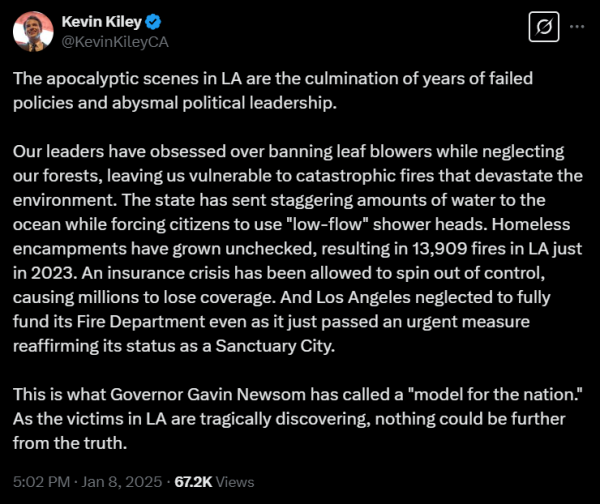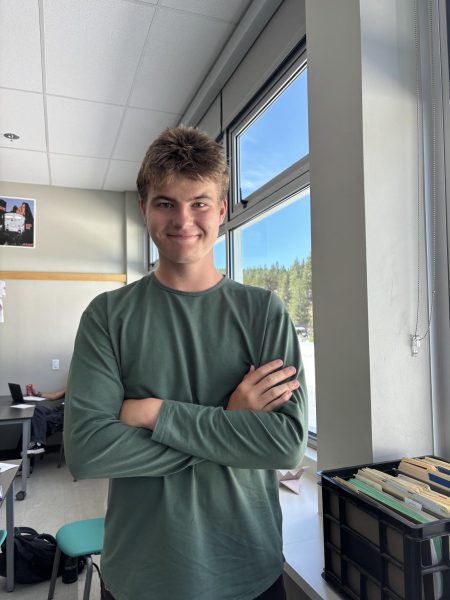Something is wrong.
Kevin Kiley, U.S. representative for California’s 3rd congressional district since 2023, recently came into the Truckee High School auditorium to share information on his role in government and the importance of civic engagement for young adults. After his short rundown, the audience was open to questions.
Sweaty were the palms of the students around me. Advisors for the event had worried expressions on their faces. Many of the questions asked by students were simplistic and aimed at getting a clear stance from Kiley. “Regarding the gas car ban, why are you pushing to reverse it, and what are some alternatives?”. “On the topic of carbon, what is your plan to control emissions in California” “What policies or initiatives do you support regarding water conservation?”
It’s no secret Kiley’s history as a representative is controversial. He was accused of violating campaign finance laws by allegedly illegally funneling money into a coalition against Proposition 47. Critics have linked him constantly to far-right groups and extreme school board candidates. He has a consistent push against reproductive rights despite the third district’s support for them. Most of his actions have been viewed as a prioritization of political agendas rather than the needs of his constituents.
When asked about his plans for many issues within the district, Kiley would address the concern, and then state that there hasn’t been as much action there because it was a matter of priority. I’m tired of this trend in debate and speech within politics where speakers will address concerns and their implications, but never actually state their viewpoint on the matter. It’s clear in the way he speaks online how he feels about the state of California.


So why can’t he state opinions like these in front of some high schoolers? Every question’s response was within the same cadence and structure. “Yes this issue is very pressing. There are all these other problems. I think it is very important. Next question.” It was frustrating to watch, not specifically because I oppose any of his views, but because democratic progress used to be built on not agreeing with everything. That’s how you establish yourself as a representative- by explicitly stating how your political ideas align with the will of your constituents. And Kiley knows this– yet he dodged every opportunity to clarify his stance. Instead of engaging with us in a meaningful discussion, he treated the auditorium like a press conference, where vague reassurances replaced real answers.
There was some misinformation as well. He stated that car crashes have risen as a result of marijuana legalization, which is a heavily debated topic. However, there is no actual connection towards the law.
I asked what his political philosophy was– I mentioned some of his common tendencies in his policies; limited government intervention, support of smaller businesses and state rights, in order to find some of his influences. I thought he could have been following in the footsteps of other Republicans like Reagan. He redirected this question on what other politicians inspired him to develop his own concepts into a statement about the people. He said he didn’t have a political ideology per se, as his decisions are based on whatever his constituents ask of him. But his actions show a clear separation from this.
How are his constituents supposed to support him if he doesn’t know his own agenda?
Students didn’t ask trick questions, they weren’t looking to trap him. They wanted transparency. Many were just looking for reasoning behind his policies, justification for those priorities, to feel like having Kiley here in the flesh could connect him individually to everyone. Instead, students were met with practiced political rhetoric, statements designed to mean everything and nothing.
The initial nervousness and excitement had shifted to a cloud of disillusionment. Some lingered to discuss things he didn’t cover, some left, shaking their heads. Some simply went back to their classes. This isn’t a tirade against Kiley. It’s just unfortunate to see our democracy as something only accessible to the adults of our country. While Kiley advocated for students to participate, I feel the talk widened that gap between students and elected officials. Students came ready, loaded with questions and a desire to understand, but that just isn’t how things played out.
So, in the spirit of Kiley, this Q&A was not a model for our nation’s leaders, but a warning. For all the talk of engaging young voters, so many politicians still prefer to keep their opinions at a comfortable distance.
But if high schoolers can see through this facade, maybe the distance isn’t as safe as they think.




Susan • Mar 12, 2025 at 8:28 pm
Nice job! You nailed it